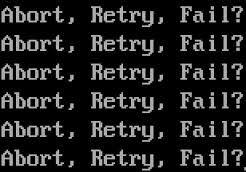- Joined
- Aug 20, 2006
- Messages
- 13,000
Okay, time to rewind. Floppy disks are still cool, right? But how do they actually work?
Follow along with the video below to see how to install our site as a web app on your home screen.
Note: This feature may not be available in some browsers.

Lol, I still flash my BIOS with the Floppy
I hate. Despise floppy disks.
I certainly do not look fondly upon memories of looking at a screen of this:
When the floppy drive decided that the disk was full of bad sectors again.
//It also happened more frequently because my parents were too cheap to actually *buy* floppies, so all of the ones that we had were re-purposed AOL disks.
Though floppies were only half as bad as hard disk compression software. With bad floppies, you'd lose some files. With hard disk compression, you'd lose *everything*
...I wish that I were born 10 years later so that I could have skipped that era of computing.
I would cut a notch on the other side of the disk so I could write data to the back side.
I hate. Despise floppy disks.
I certainly do not look fondly upon memories of looking at a screen of this:

Those 8 inch disks look huge. I didn't know that anything bigger than a 5 and a quarter existed. They look like something that you would use on a mainframe computer or something.
As a kid, having a data storage medium that could flex, seemed like a bad idea at the time.
I had a board recently (BIOS was small enough to fit on a floppy) that was a total PITA on wanting to boot from a USB flashdrive, had to break out ye ole USB floppy drive to flash the damn BIOS.lol i stopped doing that in the early 2000's when i figured out how to make bootable USB drives.
lol i still have a AOL beta
...I wish that I were born 10 years later so that I could have skipped that era of computing.



This wasn't by the LGR, it was by 8-bit Guy.Hey an LGR video, nice. He makes great stuff.
This wasn't by the LGR, it was by 8-bit Guy.
LGR just had a cameo in it.
lol nooo... if anything it adds to ones character. Patience, moments of Zen. Rage rising.. rising... falling... rising! 15-16 years from now I can tell my kid (who probably will be fed information directly to the brain via facebook AI) that "you know son, I used to have hair before I got my first computer"....I wish that I were born 10 years later so that I could have skipped that era of computing.